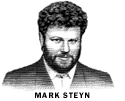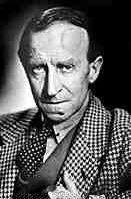| Thursday, December 09, 1999 Be careful who you call an anti-Semite Mark Steyn National Post |
 |
[...]
In the last month, [Canadian writer Mordecai] Richler has accused our former governor-general, John Buchan, of anti-Semitism [...]. Actually, it was Mordecai's son Noah, this paper's literary editor, who accused Buchan of anti-Semitism in a throwaway aside about the G-G's [Governor-General's] literary awards. The awards, he noted, were founded by "John Buchan aka Lord Tweedsmuir (the anti-Semitic author of The Thirty-Nine Steps)." After Fraser Gordon (on our letters page opposite) questioned this parenthesis, Noah's dad wrote in to say that Buchan's diaries often referred to Johannesburg as "Jew'burg" and, furthermore, "consider the following passage from The Thirty-Nine Steps, wherein the brave and good spy, Scudder, explains the ways of the world to Richard Hannay":
| "... Capital, he said, had no conscience and no fatherland. Besides, the Jew was behind it, and the Jew hated Russia worse than hell... The Jew is everywhere, but you have to go down the backstairs to find him. Take any big Teutonic business concern. If you have dealings with it the first man you meet is Prince von und zu Something, an elegant young man who talks Eton-and-Harrow English. But he cuts no ice. If your business is big, you get behind him and find a prognathous Westphalian with a retreating brow and the manners of a hog... But if you're on the biggest kind of job and are bound to get to the real boss, ten to one you are brought up against a little white-faced Jew in a bathchair with an eye like a rattlesnake. Yes, sir, he is the man who is ruling the world just now, and he has his knife into the Empire of the Tzar, because his aunt was outraged and his father flogged in some one-horse location on the Volga." |
 John Buchan is a man all Canadians can be proud of. |
Well, permit me to reopen it.
In the first place, I'm not entirely clear why Mordecai is providing Noah's footnotes. Maybe they're operating as a double-act these days. [...] But, if he was an anti-Semite, Buchan would be disappointed to find that the soi-disant "international Jewish conspiracy" has dwindled down to such a pitiful state that it now takes two Richlers to beat up one dead Scots Presbyterian.
Second, beware the ellipses. If you fill in the dot-dot-dot Richler puts after "the Jew hated Russia worse than hell...", you'll find Scudder continuing as follows: "Do you wonder?" he cried. "For 300 years they have been persecuted, and this is the return match for the pogroms." In my experience, acknowledging the Jews' centuries of suffering is not invariably a sign of the anti-Semite.
Third, I can't believe I'm having this argument with a novelist. The anti-Jew/anti-German/anti-Russian remarks are delivered by what I believe the guys in the fiction trade call a "character." It's like deducing from, say, the narrator of Barney's Version that Richler is a sexist. Down that slippery slope lies the death of all imaginative writing. How sad to see a novelist subscribing to the same philosophy as that exhibited by the Boston school that recently cancelled its production of West Side Story after complaints that "Everything's great in America" projected negative images of Puerto Rico.
In fact, I wouldn't change a word of the passage Richler deplores. It's beautifully written: vivid, muscular, brimming with life, especially the bit about the bathchair and the rattlesnake. Buchan is often sloughed off as a chronicler of upper-class English adventurers, but he's actually one of the few genuinely multicultural writers. By "multiculturalism," I don't mean the dismal agglomeration of victim groups the term has shrivelled into over here, but man in his endless variety. You'll find references to "fat Jews and blue-black dagos" and "nigger bands," but Buchan is also the author of the first English novel with a black hero, Prester John (1910), and the first anti-Nazi novel, A Prince of the Captivity (1933), with a Jew as secondary lead.
As for calling Jo'burg "Jew'burg," Jo'burg in 1902 was a town run by Scots and Jews — not dissimilar, in that sense, to the Montreal of Mordecai's childhood — and was routinely referred to as Jew'burg, not least by Jews. A year or two back, I lunched with Mordecai at his old haunt Le Mas des Oliviers. He waved airily across the room and pointed out what he called "the Kikes' Round Table." I don't think you can have it both ways. If a century from now, Celine Dion's diaries are found to contain the entry "Lunch with M Richler at the Kikes' Round Table. He said my Christmas album sucked," that would not make her an anti-Semite.
Anyway, here's some more of Buchan's dealings with the little white-faced Jews with the eyes like rattlesnakes:
— Some of his best friends were some of the best Jews, among them Chaim Weizmann, founder of the state of Israel.
— He and his bride spent the first night of their honeymoon at the home of a Jewish friend.
— He was chairman of Westminster's Parliamentary Palestine Committee, in which capacity not only was he not anti-Semitic, but, by the standards of the day, ferociously anti-anti-Semitic, denouncing "the centuries of cruelty and wrong which have stained the record of nearly every Gentile people."
— His name is inscribed in the Golden Book of the Jewish National Fund of Israel for his work on behalf of Jews.
— When the Germans published their hit list of British figures who would be arrested after the Nazi victory, Buchan was singled out for his "pro-Jewish activity."
Far be it for me to bang the gavel and pronounce "case closed," so I'll say only this to Mordecai: With enemies like this, who needs friends? When Buchan was appointed to Rideau Hall, the squish on Jewish and Nazi issues was his prime minister, the still overrated Mackenzie King. By contrast, John Buchan is one of the few non-mediocrities to hold his office, certainly when compared to its current occupant, whose principal distinction is being a competent reader of a CBC TelePrompter. The two-pronged Noah-Mordecai slur is a classic example of this country's collective amnesia: Buchan is a man all Canadians can be proud of.
[...]
John Buchan's not an anti-Semite, [...] and a novelist who devalues powerful words is debauching [debasing?] his own currency.
The complete Mark Steyn article can be found online on the National Post web site [but the link is now dead].